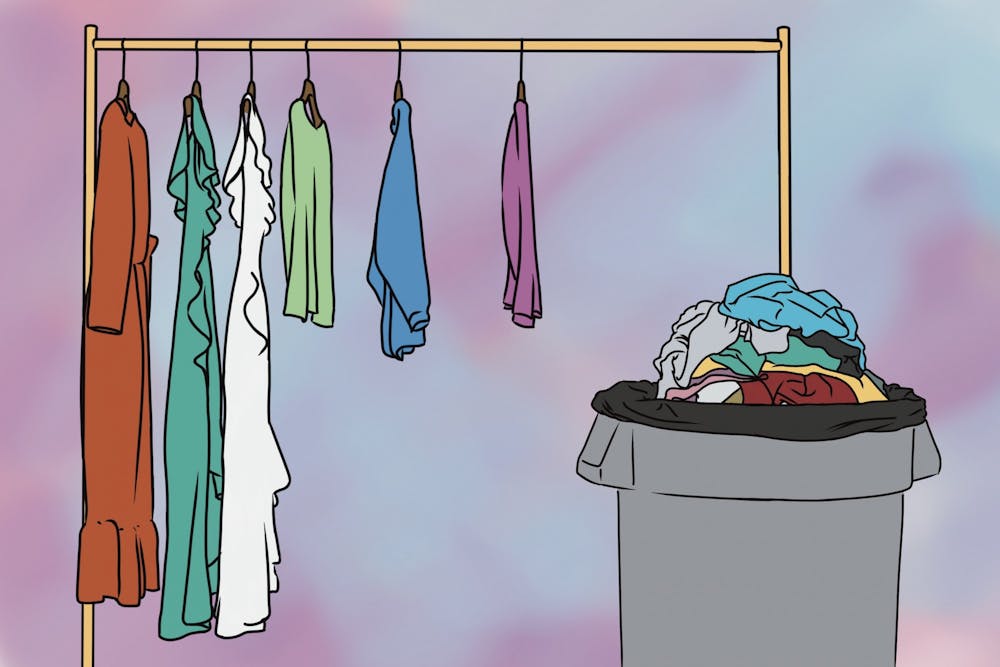From Shein to H&M, fast fashion is cute, cheap and easily accessible to many college students, however there's a darker side to the industry. One that some ASU students are looking to combat.
Fashion is among the highest polluting industries in the world. Creating clothes in a traditional factory releases heavy smog into the sky, polluting the atmosphere, and many textile processes, including dyeing fabric, use large amounts of water. These processes also often use hazardous chemicals that are released into local water systems which provide potable water.
As a result of these practices, the idea of sustainable fashion has been growing in popularity, especially over the past decade. Designers across the world are looking for ways to create, manufacture, distribute and use fashion in a way that is ethical and environmentally friendly.
At ASU, many students and faculty in the fashion program are advocates for this cause. Students and faculty across both the Herberger Institute for Design and the Arts and the College of Global Futures are innovating in their respective fields: fashion and sustainability. Students in these two schools collaborate on projects in order to create solutions to the environmental damage created by the fashion industry.
One space in which the University is working toward making ASU's fashion pedagogy more sustainable can be seen in the Humanities Lab, a research-based class that provides opportunities for students to find solutions to different social challenges, said Juliann Vitullo, the co-director of the Humanities Lab, in an email.
Students who participate in this lab work with faculty from the School of International Letters and Cultures and The Sustainability Consortium, Vitullo said, to construct new solutions for reducing pollution originating from the modern fashion industry.
"I've been spending the time learning how to repair and modify garments that I own in order to keep them in usable condition or to upcycle them and keep them from just ending up in a landfill," said Christopher Schnecke, who graduated from ASU with a bachelor's degree in global studies in May 2022 and studied in the Humanities Lab in Spring 2021.
"I've also been a lot more critical of my own shopping habits and paying attention to the development process of the brands that I buy from in order to minimize the environmental harm and exploitation of textile workers," Schnecke added.
Francesca Leonard, a graduate student studying creative enterprise and cultural leadership also recalled stories about her experience in the Sustainable Fashion Lab last year.
"Learning about the importance of clothing as a source of identity helped me to understand why fashion is such an influential industry and emphasized how critical it is to make more sustainable systems within it," Leonard said. "This class has definitely shifted my perspective on my own consumption of clothing and made me more conscious about my purchasing habits."
To Schnecke, sustainable fashion goes "beyond the clothes we wear. It means changing our consumption and production methods away from the linear economic system we currently operate under and toward a circular economic system in order to reduce waste and preserve our finite resources so that future generations can have a chance to live their lives on a habitable planet and have good quality of life."
READ MORE: Vintage shops near ASU campuses use style as a tool for confidence
The Sustainable Fashion Lab is just one example of classes that educate students on the importance and practice of sustainability in fashion. Naomi Ellis, an associate professor who teaches Survey of the Fashion Industry and Personal Style and Wardrobe at Herberger, said "sustainability is about whether or not we can continue to do what we are doing indefinitely."
Aside from classes, there are other opportunities to learn more about sustainability in fashion at ASU. Margaret Frey, a professor of fiber science and apparel design at Cornell University, spoke about sustainability in fashion at a lecture held by Herberger on Jan. 26.
Frey said fashion students should "think about the garment's end of life in the design stage" and to learn to create fashion in a way that further considers the "circular economy" — the idea of reusing, sharing and redesigning clothes.
All in all, what does this mean for sustainability in fashion? How is ASU helping effect that change?
For one, students are innovating new types of clothing in a variety of ways: making garments and accessories out of recycled items; creating clothes that are designed to last longer; and focusing on creating clothing that prioritizes sustainability and functionality over pure aesthetic. Learning about sustainability in lectures and classroom discussions and labs and then using this knowledge to craft real-world solutions is how we work toward mitigating and controlling fashion pollution.
"Ensuring that we take care of the planet and the people, cultures and societies residing on it is why environmentalism and sustainability are so strongly correlated," Leonard said. "But at the end of the day it boils down to establishing a future of continuous longevity by adapting to change."
Edited by Claire van Doren, Reagan Priest and Grace Copperthite.
Reach the reporter at sbradl23@asu.edu and follow @ShiBradleyTWT on Twitter. Like The State Press on Facebook and follow @statepress on Twitter.
Continue supporting student journalism and
donate to The State Press today.




